Our Victory Day and the questions of equality, justice, and human dignity

My friend, this is the age-old story:
The people win the fight, the king is sung for victory.
—Kazi Nazrul Islam (translation mine)
Those who wax lyrical about and shed tears over oppression and injustice in the country and the world—while at the same time remaining silent about the questions of capital, empire, state, and class—may appear to be sympathetic to the oppressed, but they actually side with the oppressor and the unjust in the final instance.
—Maulana Bhasani (translation mine)
Our Independence Day and Victory Day are organically interconnected, involving the historical vectors and valences that enacted the very becoming-and-being of Bangladesh as a distinct, sovereign state in the hardest political sense of the term. The Italian Marxist revolutionary Antonio Gramsci's famous formulation that "events are the real dialectics of history" aptly captures this relationship. Our Victory Day, celebrated on December 16, derives its significance from the Liberation War of 1971. It is impossible to contemplate the meaning of Victory Day without recognising its roots in the struggle to create an independent Bangladesh. In this reflection—both historical and conjunctural—I set aside the run-of-the-mill military details of the Pakistan army's surrender to explore broader, even unresolved questions surrounding independence and victory.
The emergence of Bangladesh as an independent state followed a victory against the neo-colonial regime of Pakistan and its military oligarchy. This hard-won independence—achieved through the Liberation War—remains the most defining political event in our history. It created conditions, at least initially, for shaping a future free from colonial and neo-colonial domination. Bangladesh's liberation holds a singular place in South Asian history: unlike other nations in the region that achieved independence through ruling-class negotiations with colonial powers, Bangladesh was born of a bloody Liberation War, marked as it was by one of the most horrific genocides in human history.
This war was decisively a people's war, fought predominantly—if not exclusively—through guerrilla tactics and fuelled by the overwhelming participation of the poor. These men, women, and even children bore the brunt of the struggle, suffering the heaviest losses. Women—as freedom fighters—played a pivotal role at multiple levels, including those from ethnic minority communities whose contributions are often elided and erased in mainstream narratives dominated by our national ruling classes, particularly the Awami League. While middle-class Bangalee leaders figure flagrantly in these accounts, how many of us know freedom fighters like Kaket Heninchita, a courageous Khasia woman, or Princha Khen, a young Rakhine girl (just to cite two names, among many others)? What kind of victory did they achieve? What did the poor—who made up the majority of the fighters—truly gain, both then and now? These questions resonate while remaining urgent and unresolved on our Victory Day even today.
Yet, the history of Bangladesh has already been written in blood, even if it remains consigned to a massive blank in the narratives of those who claim the title of "historians" in the professional or disciplinary sense. Mainstream historians often unabashedly apotheosise their so-called "heroes," celebrated as extraordinary individuals; but there are other—and othered—historians and her-storians: peasants, workers, women, minorities, and the oppressed. These people not only make history but also keep it alive through the telling and retelling of their own stories of struggle, shared in solidarity with one another. Their voices challenge us to confront whose stories are remembered, whose victories are honoured, and whose sacrifices are forgotten.
***
Indeed, the Liberation War of Bangladesh was fought by both ordinary Bangalees and non-Bangalees at immense cost, driven by the hope of building a true "people's republic" predicated on the promises of equality, social justice, and human dignity—the three core principles enshrined in the Proclamation of Independence on April 10, 1971. However, immediately after independence, the middle-class leadership—including Sheikh Mujibur Rahman, the unparalleled leader of the Liberation War, despite being in jail at the time—perpetrated violence on the very core principles of our liberation movement that his own party initially endorsed. Freedom fighters from poor backgrounds were disarmed and sent back to poverty, while a state was constructed to serve the interests of the rising Bangalee bourgeoisie.
Moreover, it was none other than Sheikh Mujibur Rahman who—his historic contributions and stature notwithstanding—sowed the seeds of fascism (I'm fully aware of how the term "fascism" gets loosely used, but the term has its nationally and historically determinate register and resonance in Bangladesh) by establishing a one-party authoritarian rule. This move also created conditions for the extrajudicial killings—with some estimates pointing to at least 30,000 deaths—as already demonstrated in the superbly researched historiographical work of Badruddin Umar, among others.
Indeed, anti-people ruling-class politicians, their followers, and subservient intellectuals forged and mobilised a proto-fascist tradition of hero-worship and cult-fetishism in the name of Muktijuddher chetona (the spirit of the Liberation War). In doing so, they erased the poor majority from the history of the Liberation War, effectively excluding them from the political, economic, and cultural policies of the new state. Despite subsequent changes in government—whether civil or military—the ruling class has remained unchanged, perpetuating inequality, injustice, and indignity in stark contrast to the core principles of our independence movement. A poignant example is Nagendranath, a courageous freedom fighter from Moulvibazar, who was reduced to begging on the streets of post-independence Bangladesh. His plight singularly serves as a stark reminder of the betrayal faced by those who sacrificed everything for liberation. Indeed, the rise of proto-fascist political and cultural practices during the Mujib era laid the groundwork for the full-blown fascist regime of Sheikh Hasina to which, of course, the 2024 July Mass Movement was nothing short of a powerful response, among other things.
In fact, the July Mass Movement emerged as the largest uprising in the history of Bangladesh. Marked by the sacrifice of over 1,500 martyrs, the movement inaugurated an unprecedented moment in the country's history. For the first time, a politically unaffiliated, student-led mass movement toppled an entrenched fascist autocracy, forcing Sheikh Hasina to flee. This movement's own victory resided not only in its outcome but in its rejection of conventional leadership in favour of a decentralised, almost non-hierarchical model, attesting to the youthful creativity and determination of the students. This truth must be recognised, no matter how the current situation with the interim government appears. Also, the immediate victory of the July uprising was deeply rooted in 15 years of socio-political struggles—often unsuccessful—that, however, fostered discontent and rage—accompanied by political awareness—ultimately culminating in the movement that toppled Sheikh Hasina.
Moreover, a significant triumph of this movement lay in its challenge to the Awami League's fascist-style commodification and idolisation of Sheikh Mujibur Rahman. In its place, the movement advanced a people-centred narrative of the 1971 Liberation War, accentuating the stubborn historical fact that ordinary individuals—not singular idols—are the true protagonists of this historic struggle. The 2024 mass movement—in which I myself was a direct participant in July and August—repeatedly called attention to the three core principles of our Liberation Movement of 1971—equality, human dignity, and justice—principles erased and violated by the Awami regime but reclaimed through the students' platform. Furthermore, the uprising exemplarily deconstructed the Awami League's long-exploited identitarian binary of "freedom fighter" versus "razakar," revealing its manipulative, authoritarian, and vindictive deployment over decades.
Indeed, the July uprising was a powerful act of resistance against decades of systemic oppression and the betrayal of the Liberation War's core principles. It's not for nothing that the Anti-Discrimination Student Movement platform recurrently declared, "A new Bangladesh will be built through the student-citizen uprising—one where equality, justice, and human dignity will prevail. A political settlement will ensure that dictatorship and fascism can never return."
Let us not forget this ardent declaration amidst the current turmoil created by the remnants of Awami fascism in Bangladesh. To remember is to resist; forgetting is defeat—victory lives in memory! So, let's remember then, you and I, the blood of the July uprising—the children, the youth, the elders brutally killed in their fight against Hasina's fascist regime. Let us reject the divisive rhetoric—in fact, the blatant falsehood—that pits 1971 against 2024, recognising instead their shared battle cry for equality, justice, and human dignity. In the words of the African Marxist revolutionary Amilcar Cabral, "Claim no easy victory!"
Indeed, every progressive mass movement in human history is simultaneously incomplete and paradoxical: it's never entirely victorious, yet never fully vanquished. The struggle for justice persists; while, of course, there are attempts—both inside and outside the country—to discredit and even besmirch the hard-won gains of the July Mass Movement. And yet, a truth looms large and remains undeniable: there can be no justice without bringing Sheikh Hasina and her collaborators themselves to justice. Equally imperative is the creation of a comprehensive record of the martyrs and the injured—a testament to their sacrifice—and the extension of necessary support to them and their families. This, at the very least, is the demand of history and the duty of our collective conscience, I reckon.
Dr Azfar Hussain is director of the graduate programme in social innovation and associate professor of integrative/interdisciplinary studies at Grand Valley State University in Michigan, US. He is also a summer distinguished professor of English and Humanities at the University of Liberal Arts Bangladesh (ULAB) and vice-president of the US-based Global Center for Advanced Studies.
Views expressed in this article are the authors' own.
Follow The Daily Star Opinion on Facebook for the latest opinions, commentaries and analyses by experts and professionals. To contribute your article or letter to The Daily Star Opinion, see our guidelines for submission.

 For all latest news, follow The Daily Star's Google News channel.
For all latest news, follow The Daily Star's Google News channel. 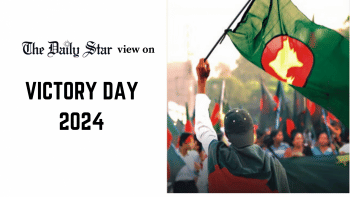



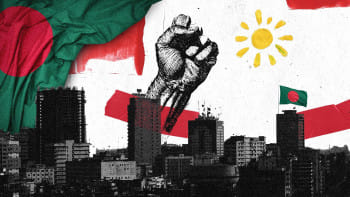
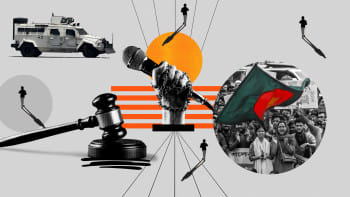



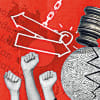


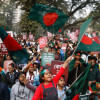


Comments